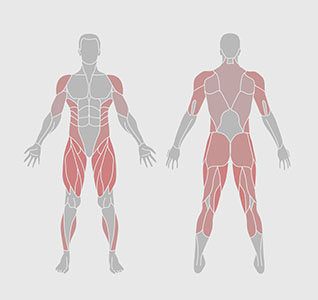Pay attention to Your Body
In the speedy world we live in, the strain to propel ourselves harder, work longer, and accomplish more has turned into a principal trait of present day life. The hustle culture, set apart by consistent movement and efficiency, frequently drives people to disregard the unobtrusive signs their bodies send while they're approaching physical, close to home, or mental burnout. Nonetheless, the way to accomplishing a good arrangement among desire and prosperity lies in a straightforward yet groundbreaking work on: paying attention to your body. Understanding and regarding your body's signs is principal for keeping up with wellbeing, supporting efficiency, and accomplishing a superior personal satisfaction.
The Body as a Messenger
The human body is a wonder of organic designing, with endless frameworks working as one to keep us working ideally. One of its most significant capacities is its ability to impart when something isn't exactly correct. Torment, weakness, distress, and strain are not irregular events; they are messages flagging that our bodies require consideration and care.
Disregarding these signs can have serious results. For example, pushing through extreme agony while practicing can prompt serious wounds, while reliably ignoring weariness can expand the gamble of ongoing pressure and related sicknesses. Then again, checking out our body's messages can assist us with keeping a feeling of harmony, diminish the probability of burnout, and work on generally prosperity.
Why We Disregard Our Bodies
In spite of the significance of body mindfulness, many individuals end up constantly overlooking their actual sensations. A few variables add to this distinction:
1. Cultural Conditioning: Numerous social orders praise perseverance and constancy. From sports to workplaces, there is a social accentuation on "pushing through" torment and distress. Individuals are commended for remaining late at the workplace or for completing a long distance race regardless of injury, supporting the idea that paying attention to one's body is an indication of shortcoming.
2. Mind Over Issue Mentality: The possibility that the psyche is more remarkable than the body has been promoted through inspirational addresses and examples of overcoming adversity. While mental strength is fundamental, it shouldn't come to the detriment of actual prosperity. Numerous people erroneously accept that beating actual uneasiness is a demonstration of their psychological strength.
3. Lack of Education: Barely any individuals are shown how to really decipher in essence flags. Wellbeing instruction frequently centers around sustenance and exercise yet seldom underlines the significance of body mindfulness and the indications of overexertion or stress.
4. Technology and Distraction: The pervasiveness of innovation and steady availability makes it more straightforward to overlook the body's messages. Many individuals go through hours slouched over screens, separated from their actual selves. This way of life can add to a general feeling of deadness or negligence for actual sensations.
The Significance of Paying attention to Your Body
1. Prevention of Injury and Illness: One of the essential advantages of paying attention to your body is the avoidance of injury and disease. At the point when you experience torment during active work, it is an admonition that something is off-base. Agony ought not be overlooked or "pushed through" but instead regarded as a sign to rest or change your action. Likewise, tireless exhaustion is in many cases a sign that the body needs more rest, legitimate nourishment, or a break from stressors.
2. Improved Mental Health: Persistent pressure and burnout can show truly as migraines, muscle strain, or stomach related issues. By checking out your body, you can turn out to be more mindful of what stress means for you and find proactive ways to oversee it. Enjoying reprieves when you feel overpowered, rehearsing care, or participating in supportive exercises can essentially work on emotional wellness.
3. Enhanced Athletic Performance: Competitors, specifically, can profit from paying attention to their bodies. The "no aggravation, no addition" attitude can be hazardous, prompting overtraining and long haul harm. Going against the norm, competitors who foster areas of strength for an of body mindfulness can change their preparation regimens to enhance execution while limiting the gamble of injury. Knowing when to rest and when to push harder is urgent for accomplishing top athletic execution.
4. Better Productivity: As opposed to mainstream thinking, enjoying reprieves and resting when required can prompt more noteworthy efficiency. Weakness and stress impede mental capability, making it challenging to focus and think inventively. By focusing on your energy levels and resting when important, you can keep up with more elevated levels of concentration and effectiveness over the course of the day.
Perceiving Your Body's Signals
Turning out to be more receptive to your body requires practice and deliberateness. Here are a few normal signals that show the requirement for rest or change:
1. The fact that something is off-base makes pain: torture an immediate sign. It can go from gentle uneasiness to sharp, extraordinary sensations. While certain types of uneasiness, similar to muscle irritation after an exercise, are typical, sharp or tireless agony ought not be disregarded. It is vital to stop the action causing agony and look for clinical exhortation if essential.
2. The fact that the body needs rest makes fatigue: depletion a typical sign. This can be actual exhaustion from extreme activity or mental weakness from delayed fixation. Persistent weariness might demonstrate lack of sleep, exhaust, or a hidden ailment. Rather than depending on energizers like caffeine to push through, it's fundamental for rest and re-energize.
3. Tension and Tightness: Many individuals convey pressure in their muscles, particularly in the neck, shoulders, and back. In the event that you notice pressure or snugness, it could be an indication of physical or close to home pressure. Setting aside some margin to extend, practice profound breathing, or participate in unwinding procedures can assist with alleviating this pressure.
4. Digestive Issues: The stomach related framework is exceptionally delicate to stress and dietary decisions. Bulging, stomach spasms, or unpredictable solid discharges can demonstrate that your body is battling to handle something, whether it's food or close to home trouble. Focusing on how your body responds to various food varieties and stressors can assist you with settling on better way of life decisions.
5. Shortness of Breath or Quick Heartbeat: These side effects can happen during snapshots of nervousness or actual effort. On the off chance that you notice your heart hustling or trouble taking in circumstances where it shouldn't, it's an indication to dial back, work on quieting methods, or look for clinical counsel.
Practices to Develop Body Awareness
Creating body mindfulness is an expertise that can be sharpened through steady practice. Here are a few techniques to assist you with paying attention to your body all the more really:
1. Mindful Movement: Practices like yoga, judo, and Pilates accentuate the association among breath and development, empowering experts to give close consideration to how their bodies feel. These exercises can assist you with turning out to be more mindful of your actual cutoff points and figure out how to move such that feels sustaining instead of exhausting.
2. Regular Check-Ins: Take a couple of seconds over the course of the day to respite and check in with your body. Shut your eyes, take a couple of full breaths, and sweep your body for any areas of pressure or inconvenience. Ask yourself how you're feeling and what you want at that time.
3. Restorative Rest: Quality rest and unwinding are crucial for generally prosperity. Focus on getting sufficient rest every evening and consider integrating supportive practices like snoozing, reflection, or basically carving out opportunity to sit idle.
4. Hydration and Nutrition: Legitimate hydration and adjusted nourishment assume an essential part in how your body feels. Focus on how various food sources cause you to feel. Do they stimulate you or cause you to feel drowsy? Pay attention to your body's signs in regards to appetite and thirst, and mean to sustain yourself with supplement thick, entire food sources.
5. Breath Awareness: Your breath is a strong mark of how your body is feeling. Shallow, quick breathing frequently goes with pressure, while profound, slow breaths can flag unwinding. Rehearsing breathwork procedures can assist you with overseeing pressure and become more on top of your body.
Knowing When to Look for Help
While paying attention to your body is fundamental, it is similarly critical to perceive when proficient intercession is essential. In the event that you experience tireless torment, weakness, or other concerning side effects, counseling a medical services supplier is significant. Some of the time, seemingly ordinary distress can be an indication of a more serious hidden condition.
Also, psychological well-being experts can help if stress, uneasiness, or misery are influencing your actual prosperity. Treatment, advising, and uphold gatherings can offer significant direction and survival methods.
The Harmony Among Pushing and Resting
Figuring out the harmony between propelling yourself and resting is a continuous interaction. Development, whether physical, close to home, or expert, frequently requires venturing outside your usual range of familiarity. In any case, it is crucial to perceive that rest is definitely not an indication of shortcoming yet a key piece of the development cycle.
Tip top competitors grasp the worth of rest days, and effective experts recognize the significance of get-aways and downtime. By embracing rest as an essential part of execution and prosperity, you permit your body to recuperate, adjust, and become more grounded.
Conclusion
Paying attention to your body is certainly not a uninvolved demonstration however a functioning, careful practice that requires mindfulness and expectation. It is tied in with fostering a relationship with your actual self, one in view of regard, understanding, and care.





0 Comments